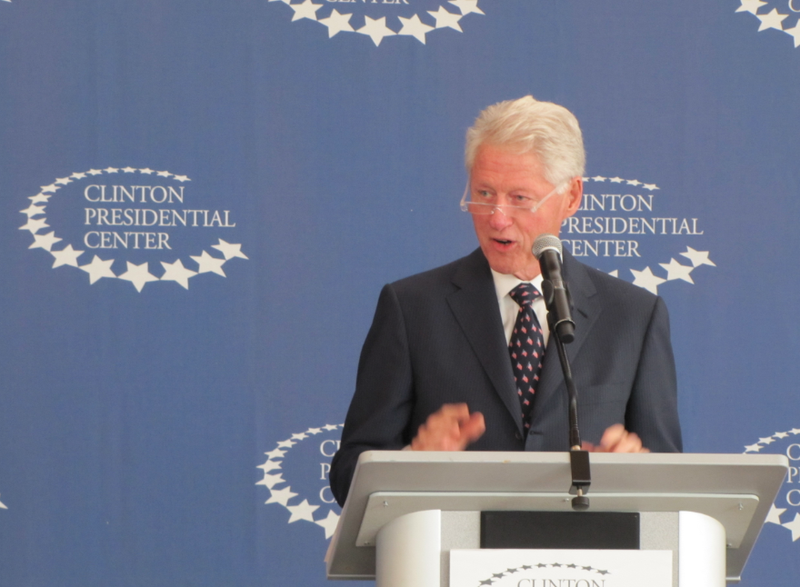LITTLE ROCK — Former President Bill Clinton delivered the keynote address at a symposium in Little Rock Tuesday about the Bosnian war that ended in 1995.
Clinton was the last speaker at the event at his presidential library in Little Rock marking the declassification of several hundred CIA documents about the conflict.
"Like all of history, there are many questions still pending," Clinton said to close his 45-minute address. "But the peace has held. Because a long time ago with a lot of other things going on, good people were given good information and made good decisions."
Clinton called releasing the documents "an important part of the public trust," said he didn't believe public opinion should determine foreign policy and insisted that all along the U.S. "did have a dog in the Bosnian fight." He said Serbian president Slobodan Milošević was "intelligent, articulate, cordial and the coldest man I ever met in my life."
"I have never looked into darker eyes in my life," Clinton said of their meeting at a formal signing of the 1995 peace agreement.
And Clinton touched, ever so briefly, on the federal government shutdown that went into effect earlier Tuesday, noting the Bosnian peace agreement was reached between two such shutdowns.
"Quite appropriate for today, don't you think?" he quipped.
The "Bosnia, Intelligence, and the Clinton Presidency" symposium, which began shortly after 1 p.m., also featured appearances by former Secretary of State Madeleine Albright, retired Gen. Wesley Clark and former deputy National Security Advisor Samuel Berger.
Berger, deputy National Security Advisor from 1993 to 1997, recounted how Clinton got behind a plan to "take over the Bosnian enterprise" from the United Nations despite there being little support for it. He noted only 3 percent of the public believed Bosnia was important then and that Clinton's approval rate was a mere 34 percent on the issue.
"But he believed we had to act," Berger said.
Berger described a "tell-don't ask" approach to getting the rest of Europe to support a bombing campaign of Serbia that ultimately led to a ceasefire agreement and the Dayton peace accord, which in 1995 ended the war.
Berger called the success a "lesson about American leadership."
"Where we lead, generally countries follow," Berger said. "We are the big dog. That leadership starts with the president. President Clinton led here and that leadership led to ending the war in Bosnia, which I think is an extraordinary legacy of his presidency."
Clark described traveling with diplomat Richard Holbrooke to meet with Milošević during the bombing campaign and, on the second trip, negotiating the peace agreement. Albright talked about her efforts to declassify photographs that corroborated a survivor's story of genocide in Srebrenica to garner support for military action from the international community.
"And it was silent as people kind of looked at these pictures which told the story and matched the story that the [survivor] had given," Albright said. "And it was really chilling."
John Gannon, former CIA deputy director for intelligence, said unprecedented "collaborative relationship" in the form of the Interagency Balkan Task Force between the intelligence community and policymakers was critical.
"I think the maturation of that process was responsible for a lot of the success that we enjoyed," he said.
The event comes as the CIA recently released more than 300 declassified documents related to the conflict.
It marks the first time a presidential library has participated in a declassification event and the first time such a large collection of documents have been opened before the 25-year automatic declassification date, officials said.
The Bosnian war began in 1992 and claimed more than 100,000 lives before the 1995 peace agreement. Bosnia remained independent but divided into two autonomous regions.
The Associated Press contributed to this story
